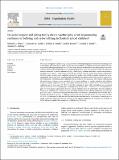Do social support and eating family meals together play a role in promoting resilience to bullying and cyberbullying in Scottish school children?
Abstract
This study investigates if cyberbullying is associated with wellbeing independently of traditional bullying and if social support and eating family meals together promotes resilience by buffering adolescents against the consequences of both types of bullying. Data for 5286 eleven, thirteen and fifteen year olds participating in the cross-sectional 2018 Scottish Health Behaviour in School-aged Children study were analysed. Adolescent self-report measures were used to assess traditional bullying, cyberbullying, classmate and teacher support and frequency of family meals together. Psychological wellbeing was assessed with the 5-item World Health Organization Wellbeing index. Analyses were conducted separately by gender with multilevel models, adjusting for sociodemographic factors. Resilience to bullying and cyberbullying was operationalised using statistical interactions. For both genders, cyberbullying and traditional bullying measures were associated with reduced wellbeing and all social support indicators were associated with increased wellbeing. In models containing both bullying measures, frequent traditional bullying victimisation was associated with a 7.2 (95% CI: 3.4–10.1) reduction in wellbeing score for boys and a 7.2 (95% CI: 4.5–10.0) reduction for girls, while cyberbullying was associated with 10.5 (95% CI: 5.8–15.1) reduction in wellbeing score for boys and 11.1 (95% CI: 6.7–15.5) reduction for girls. For both genders adjusting for classmate support explained away the relationships between traditional bullying and wellbeing, but cyberbullying was associated negatively with wellbeing independent of social support. Only one of 12 interaction tests provided any evidence of resilience. Cyberbullying was associated with a 7.8 (95% CI: 0.2–15.4) reduction in wellbeing score for girls who ate with their family every day, and 17.3 (95% CI: 10.5–24.1) reduction for girls who ate with their families less than weekly. In conclusion, cyberbullying is a strong, albeit rare, threat to adolescent wellbeing. Social support is important for wellbeing, but its ability to buffer adolescents against the consequences of bullying may be limited.
Citation
Shaw , R J , Currie , D B , Smith , G S , Brown , J , Smith , D J & Inchley , J C 2019 , ' Do social support and eating family meals together play a role in promoting resilience to bullying and cyberbullying in Scottish school children? ' , SSM - Population Health , vol. 9 , 100485 . https://doi.org/10.1016/j.ssmph.2019.100485
Publication
SSM - Population Health
Status
Peer reviewed
ISSN
2352-8273Type
Journal article
Description
Funding for the Scottish 2018 HBSC Survey was provided by NHS Health Scotland. This work was also supported by the MRC Mental Health Data Pathfinder Award (reference MC_PC_17217).Collections
Items in the St Andrews Research Repository are protected by copyright, with all rights reserved, unless otherwise indicated.

